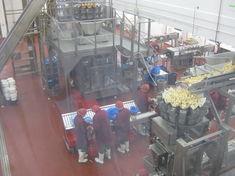
Branston Ltd has confirmed that plans to build a large-scale anaerobic digestion plant that will turn waste potatoes into electricity are to go ahead, with construction work starting next month.
The anaerobic digestion plant is part of a £1.4 million investment in green technologies at its Lincolnshire site, which will also include major upgrades to its water management system.
The investment will save Branston, which supplies potatoes to Tesco, more than 40 per cent on electricity and 60 per cent on water at the site, as well as taking one HGV load of waste off the road each day.
A £568,000 grant from the Rural Development Programme for England (RDPE), which is funded by DEFRA and the EU and delivered by the East Midlands Development Agency (EMDA), has just been awarded to make the development of this new plant possible.
When up and running, Branston’s anaerobic digestion plant will produce 300kw of electricity. The green electricity will be complemented by the introduction of a new water recycling plant, which will recycle some 60 per cent of the water used to wash potatoes. Branston’s fresh potato facility and its brand new £3.5m prepared food factory are both set to benefit from the new infrastructure.
The investment is the latest in several projects undertaken as part of Branston’s environmental strategy, which has led the company to become the first UK food producer to receive the Carbon Trust Standard and ISO 14001 accreditation.
Mark Willcox, development director for Branston, said: “At Branston, we are committed to working in harmony with the environment. This exciting development is a continuation of that strategy and will help us by reducing our utility costs and help the environment by reducing our use of fossil fuels.
“We will be using outgrade potatoes, which are unfit for consumption, to produce a significant amount of electricity and in doing so become one of the first food producers in the UK to harness such innovative and environmentally friendly technology. As well as being incredibly efficient, the anaerobic digestion plant is also safe, quiet and odourless. The combined heat and power plant will be complemented by the water recycling plant, which will considerably reduce our mains water consumption and ensure we maximise efficiencies throughout our two factories on site.”
While new to Branston, the technology behind the anaerobic digestion plant is well established. Waste is fed into a digester, where a reaction with friendly bacteria in the system takes place, producing a mix of gases including methane.
Branston has also worked with the Environment Agency to upgrade its water treatment plant to a water recycling plant.



